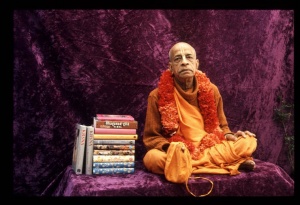SB 1.5.2: Difference between revisions
m (1 revision(s)) |
(Vanibot #0054 edit - transform synonyms into clickable links, which search similar occurrences) |
||
| (One intermediate revision by one other user not shown) | |||
| Line 1: | Line 1: | ||
{{info | {{info | ||
|speaker= | |speaker=Nārada Muni | ||
|listener= | |listener=Śrīla Vyāsadeva | ||
}} | }} | ||
[[Category:Srimad-Bhagavatam - Canto 01 Chapter 05|S02]] | |||
[[Category:Bhagavatam Verses Spoken by Narada Muni - Vanisource|010502]] | |||
<div style="float:left">'''[[Srimad-Bhagavatam]] - [[SB 1|First Canto]] - [[SB 1.5: Narada's Instructions on Srimad-Bhagavatam for Vyasadeva|Chapter 5: Nārada's Instructions on Śrīmad-Bhāgavatam for Vyāsadeva]]'''</div> | |||
<div style="float:right">[[File:Go-previous.png|link=SB 1.5.1]] '''[[SB 1.5.1]] - [[SB 1.5.3]]''' [[File:Go-next.png|link=SB 1.5.3]]</div> | |||
{{CompareVersions|SB|1.5.2|SB 1962|SB 1972-77}} | |||
{{RandomImage}} | |||
==== TEXT 2 ==== | ==== TEXT 2 ==== | ||
<div | <div class="verse"> | ||
nārada uvāca | :nārada uvāca | ||
pārāśarya mahā-bhāga | :pārāśarya mahā-bhāga | ||
bhavataḥ kaccid ātmanā | :bhavataḥ kaccid ātmanā | ||
parituṣyati śārīra | :parituṣyati śārīra | ||
ātmā mānasa eva vā | :ātmā mānasa eva vā | ||
</div> | </div> | ||
| Line 18: | Line 24: | ||
==== SYNONYMS ==== | ==== SYNONYMS ==== | ||
<div | <div class="synonyms"> | ||
''[//vanipedia.org/wiki/Special:VaniSearch?s=nāradaḥ&tab=syno_o&ds=1 nāradaḥ]'' — Nārada; ''[//vanipedia.org/wiki/Special:VaniSearch?s=uvāca&tab=syno_o&ds=1 uvāca]'' — said; ''[//vanipedia.org/wiki/Special:VaniSearch?s=pārāśarya&tab=syno_o&ds=1 pārāśarya]'' — O son of Parāśara; ''[//vanipedia.org/wiki/Special:VaniSearch?s=mahā&tab=syno_o&ds=1 mahā]-[//vanipedia.org/wiki/Special:VaniSearch?s=bhāga&tab=syno_o&ds=1 bhāga]'' — the greatly fortunate; ''[//vanipedia.org/wiki/Special:VaniSearch?s=bhavataḥ&tab=syno_o&ds=1 bhavataḥ]'' — your; ''[//vanipedia.org/wiki/Special:VaniSearch?s=kaccit&tab=syno_o&ds=1 kaccit]'' — if it is; ''[//vanipedia.org/wiki/Special:VaniSearch?s=ātmanā&tab=syno_o&ds=1 ātmanā]'' — by the self-realization of; ''[//vanipedia.org/wiki/Special:VaniSearch?s=parituṣyati&tab=syno_o&ds=1 parituṣyati]'' — does it satisfy; ''[//vanipedia.org/wiki/Special:VaniSearch?s=śārīraḥ&tab=syno_o&ds=1 śārīraḥ]'' — identifying the body; ''[//vanipedia.org/wiki/Special:VaniSearch?s=ātmā&tab=syno_o&ds=1 ātmā]'' — self; ''[//vanipedia.org/wiki/Special:VaniSearch?s=mānasaḥ&tab=syno_o&ds=1 mānasaḥ]'' — identifying the mind; ''[//vanipedia.org/wiki/Special:VaniSearch?s=eva&tab=syno_o&ds=1 eva]'' — certainly; ''[//vanipedia.org/wiki/Special:VaniSearch?s=vā&tab=syno_o&ds=1 vā]'' — and. | |||
</div> | </div> | ||
| Line 25: | Line 31: | ||
==== TRANSLATION ==== | ==== TRANSLATION ==== | ||
<div | <div class="translation"> | ||
Addressing Vyāsadeva, the son of Parāśara, Nārada inquired: Are you satisfied by identifying with the body or the mind as objects of self-realization? | Addressing Vyāsadeva, the son of Parāśara, Nārada inquired: Are you satisfied by identifying with the body or the mind as objects of self-realization? | ||
</div> | </div> | ||
| Line 32: | Line 38: | ||
==== PURPORT ==== | ==== PURPORT ==== | ||
<div | <div class="purport"> | ||
This was a hint by Nārada to Vyāsadeva regarding the cause of his despondency. Vyāsadeva, as the descendant of Parāśara, a greatly powerful sage, had the privilege of having a great parentage which should not have given Vyāsadeva cause for despondency. Being a great son of a great father, he should not have identified the self with the body or the mind. Ordinary men with a poor fund of knowledge can identify the body as self or the mind as self, but Vyāsadeva should not have done so. One cannot be cheerful by nature unless one is factually seated in self-realization, which is transcendental to the material body and mind. | This was a hint by Nārada to Vyāsadeva regarding the cause of his despondency. Vyāsadeva, as the descendant of Parāśara, a greatly powerful sage, had the privilege of having a great parentage which should not have given Vyāsadeva cause for despondency. Being a great son of a great father, he should not have identified the self with the body or the mind. Ordinary men with a poor fund of knowledge can identify the body as self or the mind as self, but Vyāsadeva should not have done so. One cannot be cheerful by nature unless one is factually seated in self-realization, which is transcendental to the material body and mind. | ||
</div> | </div> | ||
__NOTOC__ | |||
<div style="float:right; clear:both;">[[File:Go-previous.png|link=SB 1.5.1]] '''[[SB 1.5.1]] - [[SB 1.5.3]]''' [[File:Go-next.png|link=SB 1.5.3]]</div> | |||
__NOTOC__ | |||
__NOEDITSECTION__ | |||
Latest revision as of 18:10, 17 February 2024

A.C. Bhaktivedanta Swami Prabhupada
TEXT 2
- nārada uvāca
- pārāśarya mahā-bhāga
- bhavataḥ kaccid ātmanā
- parituṣyati śārīra
- ātmā mānasa eva vā
SYNONYMS
nāradaḥ — Nārada; uvāca — said; pārāśarya — O son of Parāśara; mahā-bhāga — the greatly fortunate; bhavataḥ — your; kaccit — if it is; ātmanā — by the self-realization of; parituṣyati — does it satisfy; śārīraḥ — identifying the body; ātmā — self; mānasaḥ — identifying the mind; eva — certainly; vā — and.
TRANSLATION
Addressing Vyāsadeva, the son of Parāśara, Nārada inquired: Are you satisfied by identifying with the body or the mind as objects of self-realization?
PURPORT
This was a hint by Nārada to Vyāsadeva regarding the cause of his despondency. Vyāsadeva, as the descendant of Parāśara, a greatly powerful sage, had the privilege of having a great parentage which should not have given Vyāsadeva cause for despondency. Being a great son of a great father, he should not have identified the self with the body or the mind. Ordinary men with a poor fund of knowledge can identify the body as self or the mind as self, but Vyāsadeva should not have done so. One cannot be cheerful by nature unless one is factually seated in self-realization, which is transcendental to the material body and mind.